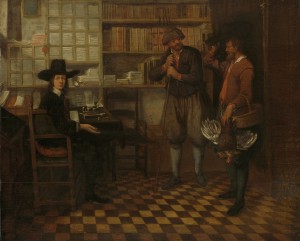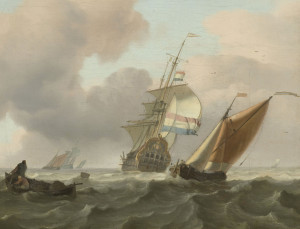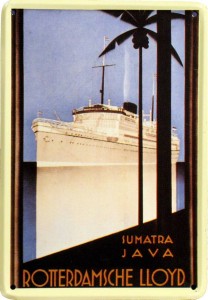Searching for records using Google or Ancestry will only get you so far. You will just find records that have already been indexed and put online. If searching does not give you the records you need to answer your research question, try to think like an archivist to understand what other records may exist.
Five step plan to find out more about your ancestors

Paying the rent, 1660s. Image credits: Rijksmuseum
Every record is created for a specific reason: some are required by law, others are created to inform people or to run a business. Records about your ancestor may have been created by many different people, some of whom he may never even have met. Personal records created by individuals often haven’t survived, but records created by organizations may still exist.
To find these records, answer these questions:
- What events and processes was your ancestor involved in?
- What organizations would he have interacted with during these events?
- What records would these organizations have created as a result?
- Where are those records today?
- How can I access them?
Example: finding information about a sea captain
The other day, a visitor of this website asked me how to find more information about her ancestor, who was a sea captain of a merchant ship in the 19th century. Let’s think for a moment about the processes and events a sea captain may have been involved in throughout his career. Which organizations would he have been in contact with and what records would they have created at that time?
By answering the first three questions, we end up with this table:
| Process | Organization | Records created |
|---|---|---|
| Training | sailor’s school | enrollment records |
| shipping company | personnel records | |
| Employment | shipping company | personnel records |
| muster rolls | ||
| Getting a crew for the vessel | shipping company | muster rolls |
| ships’ logs | ||
| Transporting goods from one harbor to another | shipping company | ships’ logs |
| clients | financial administration | |
| harbor authorities | bulletins | |
| public notary | contracts | |
| news agencies | newspaper bulletins | |
| Ship wrecks or accidents | shipping company | correspondence |
| minutes of meetings | ||
| (annual) reports | ||
| insurance company | claims | |
| harbor authorities | bulletins | |
| news agencies | newspaper articles | |
| Retirement | shipping company | pension records |
In just a few minutes of brainstorming, we have assembled a whole list of potential records we could be looking for. Depending on our research goal, some records may be more likely to advance our research than others. For this example, let’s assume we are writing a biography and want to know all we can about his career.
Develop a strategy

Turbulent sea, by Ludolf Bakhuysen, 1697. Image credits: Rijksmuseum
The archives of the shipping company look the most promising, as the muster rolls and ships’ logs should give us information about several stages of our sea captain’s career, plus they may contain information about any shipwrecks or accidents he was involved in. But the newspaper bulletins and articles may be the easiest to access, as a growing number of newspapers are available online, and they might tell us the most interesting stories to use for our narrative.
Identify the organizations
To find the shipping company records, you would need to know the name of the company. The same goes for the other organizations in our list. Where would a Dutch boy have gone to school if he wanted to become a sailor? What insurance company may have insured the vessels? What notary was closest?
A literature survey in newspapers, magazines and books (online or offline) may help you to identify the organizations. Find a book about maritime history in the Netherlands to learn how sailors were trained or look for newspaper bulletins that may tell you when the ship docked and who owned the ship. By starting with a newspaper search, we catch two birds with one stone: we may find out about the company and find some great stories in the process.
Locate the records
 Once you have identified the shipping company, try to find out where their records are kept today. A good candidate would be a local or regional archive in the town or region where the headquarters of the company were located. Search the catalogs and finding aids of these archives’ websites for the name of the company, or do a Google search for the name of the company plus a word like “archief” [archive] or “archive”. Always keep in mind that the captain may have been Dutch, but he could easily have been working for an Australian, American or British company.
Once you have identified the shipping company, try to find out where their records are kept today. A good candidate would be a local or regional archive in the town or region where the headquarters of the company were located. Search the catalogs and finding aids of these archives’ websites for the name of the company, or do a Google search for the name of the company plus a word like “archief” [archive] or “archive”. Always keep in mind that the captain may have been Dutch, but he could easily have been working for an Australian, American or British company.
Records of several Dutch shipping companies, such as the “Koninklijke Rotterdamsche Lloyd” [Royal Lloyd’s of Rotterdam], are kept at the Rotterdam Municipal Archives. Finding aids for these company archives can be found online.
Consulting the records
The types of records we have identified are usually not available online and can only be accessed on-site. Most archives will not do the research for you but will only do look-ups if you know exactly which record and page you’re looking for (which you usually don’t). So someone will need to visit archive to do research in those records. You can go there yourself of find a local researcher to do the research for you. See the page about our professional services if you are looking for a genealogist to do research in records of a Dutch shipping company in an archive in the Netherlands.
Applying this methodology to your research
The example is about sea captains, but the approach is useful for just about any research problem. By following this process, you may discover a whole new range of records out there. Please let me know if it works for you too. Your ancestor’s stories are waiting for you to find them!


Now you’ve made me wonder if there was some kind of training for a super cargo with the West India Company in the 1650’s.